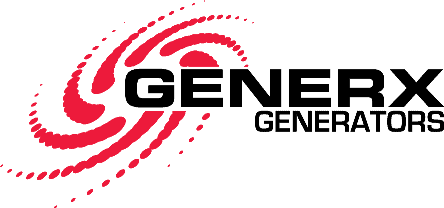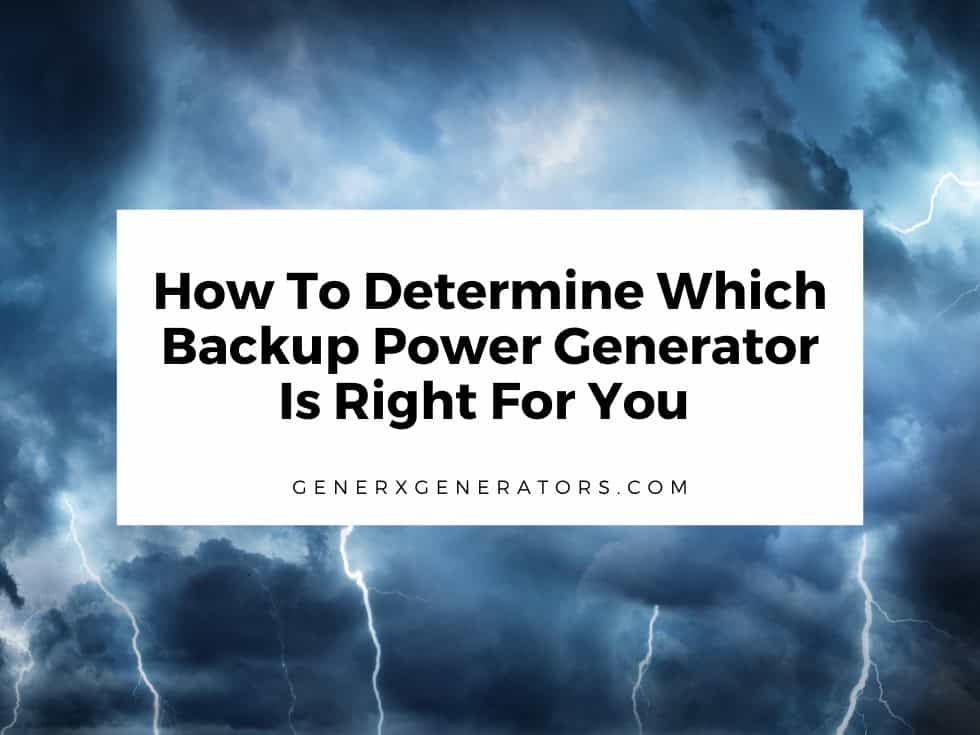Choosing the right backup generators in one’s home is essential for ensuring uninterrupted power for your home or business. It is crucial to grasp which size best fits your requirements to make the optimal decision.
It is determined by considering the overall square footage of your property and the total wattage required for your power needs. Based on these factors, this guide will determine the perfect generator, whether it is a standby or portable generator for you.
How Much Generator Power Do You Need?
To determine the appropriate generator size for your residential needs, follow these steps:
- List Your Essential Appliances and Systems: List the essential appliances and systems you want to power during an outage. If applicable, Include refrigerators, HVAC systems, lighting, well pumps, and medical equipment.
- Determine Starting and Running Watts: Identify the starting (surge) and running (continuous) power requirements of each appliance/system. This information is typically found on the appliance’s label or user manual. Some devices, like refrigerators and air conditioners, have high starting watts.
- Calculate Total Wattage: Add up the running watts of all appliances and systems to calculate your total running wattage. Be sure to account for the highest starting wattage item, as the generator must handle this peak demand.
- Factor in Future Needs: Consider any additions or changes in your electrical load and potential expansion of your backup power requirements.
- Use a Residential Generator Sizing Calculator: Now, you can use a Residential Generator Sizing Calculator to help you determine the appropriate generator size based on your calculations and specific needs.
Understanding Wattage
The overall wattage or power your generator will need depends on the quantity and type of items or equipment you want to use during power outages. To accurately calculate your needs, it’s best to understand what starting, running, and surge wattage are.
- First, your running wattage is the total amount of electricity you need to keep the device running.
- Second, just as it sounds, your starting wattage is the electricity you need to start the device running. On average, the power output you need to create a device is usually three times the amount you need to keep it running.
- Lastly, surge wattage is the most power you can obtain from your generator.
We determined the average home square footage in our various service areas. We selected the most common equipment run during a power outage to choose three size suitable Generator options best suited for your needs.
Types of Generators
Home Standby Generators
- Home standby generators are permanent fixtures.
- They are designed to provide backup power during electrical outages automatically.
- Standby generators connect with the home’s electrical system and run on propane or natural gas.
- Home standby generators can power essential appliances and systems in a home, such as lights, heating/cooling, refrigeration, and security systems.
Portable Generators
- Portable generators are smaller, more mobile units that can be moved to different locations.
- They are commonly used for outdoor activities, camping, construction sites, or as a home backup power source.
- Depending on the model, portable generators run on various fuels, including gasoline, propane, or diesel.
- They provide temporary power to selected appliances and devices via extension cords.
Inverter Generators
- Inverter generators, renowned for their fuel efficiency and consistent power output, are a category of portable generators highly regarded for their superior performance.
- They use advanced electronics to produce clean and stable electricity, making them suitable for sensitive electronics like laptops and smartphones.
- Inverter generators are generally quieter than conventional portable generators and often have a smaller and more lightweight design.
Diesel Generators
- Diesel generators utilize diesel fuel to generate electricity.
- They are known for their durability, fuel efficiency, and long-running capabilities, making them ideal for continuous or long-term power generation.
- Diesel generators are used in industrial settings, construction sites, and as backup power sources for businesses and extensive facilities.
These are the main types of generators you mentioned, each with its advantages and applications. The choice of generator type depends on the intended use, power requirements, mobility needs, and fuel availability.
Factors to Considering When Buying a Backup Power Generator
There are several important factors to consider when buying a backup power generator, whether for a whole house or partially or fully managed power. Here are five key factors to keep in mind:
Power Requirements:
- Determine your power needs, including the essential appliances, systems, and devices you want to run during an outage. A whole-house generator includes HVAC systems, refrigeration, lighting, and more. For partial or fully managed power, identify critical loads.
- Make sure to select a generator capable of meeting your anticipated power requirements.
- Consider both the running (continuous) and startup (surge) power requirements of your appliances and systems.
Fuel Type and Availability:
- Consider the fuel type that best suits your needs and availability in your area. Common options include natural gas, propane, diesel, and gasoline.
- Evaluate the cost and accessibility of the chosen fuel source and the generator’s fuel efficiency and runtime on a single tank.
Generator Type:
- Decide whether you need a whole-house standby generator, a partially managed power solution, or a fully managed power solution based on your priorities and budget.
- Whole house generators automatically provide power to your entire home, while partial and fully managed power solutions offer customized power distribution to selected circuits or critical loads.
Installation and Maintenance:
- Consider the installation process and maintenance requirements. Whole house generators typically require professional installation, while portable generators may be easier to set up.
- Regular maintenance is crucial for generator reliability. Check if the manufacturer provides maintenance guidelines and whether you can access service and support quickly.
Budget and Financing:
- Determine your budget for both the generator purchase and installation costs. Whole house generators are more expensive due to their capacity and automatic transfer switch.
- Explore financing options, including loans or payment plans, to make the purchase more manageable.
- Factor in the long-term cost of fuel and maintenance when calculating the total cost of ownership.
Additionally, it’s essential to research reputable generator brands and read reviews from other users to assess reliability and performance. Always consult a qualified electrician or generator expert to help you make an informed decision based on your specific needs and circumstances.
Popular Types of Residential Generators in Florida
Guardian Series
The 22 kW* Guardian® Series home standby generator is the largest air-cooled home standby generator on the market. It delivers all the features and functionality customers have come to expect from the market-leading brand of home standby generators. It has an MSRP that is the lowest cost per kilowatt of any air-cooled home standby generator.
*Other sizes available in this series
Synergy Series
As the standby generator market leader, Generac continues to deliver innovation. Their new Generac Synergy 20kW variable speed portable backup generator, the industry’s first variable speed home backup power generator, provides homeowners with the highest technology available today.
*Other sizes available in this series
QuietSource Series
Premium features are standard for the QuietSource Series, the ultimate standby generator. Thanks to the low-speed engine, it’s so quiet you’ll forget you own a generator until you need it. It is ideal for large residential and small to medium commercial applications.
A Low-speed, automotive-style liquid-cooled engine runs at only 1800 rpm during power outages for a substantially quieter, unlike a portable generator, with greater natural gas fuel efficiency and more extended engine and alternator life. Standard aluminum, all-weather enclosure provides the ultimate protection from the elements.
Aluminum’s natural corrosion resistance prolongs the life of your generator and is recommended for salt-air coastal locations.
Protector+ Series
Generac’s Protector Series offers benefits that competitors can’t match: installation flexibility and cost reduction, as well as reduced emissions compared to diesel gensets, and is backed by the industry’s best warranty offered by Generac. The Protector+ Series delivers best-in-class portable power quality with less than 5% total harmonic distortion (THD) for clean, smooth operation of sensitive business electronics and appliances.
Standard aluminum, all-weather enclosure provides the ultimate protection from the elements. Aluminum’s natural corrosion resistance prolongs the life of your portable generators and is recommended for salt-air coastal locations.
Popular Types of Commercial & Industrial Generators in Florida
QuietSource Series
Premium features are standard for the QuietSource Series, the ultimate standby generator. Thanks to the low-speed engine, it’s so quiet you’ll forget you own a generator until you need it.
It is ideal for large residential and small to medium commercial applications.
Industrial Series
An efficient choice for high kW applications and facilities where code requirements call for on-site fuel-powered generator storage, like hospitals and 911 call centers, Generac industrial diesel gensets are meticulously tailored to meet the unique needs of every application. These robust engines have demonstrated exceptional performance and reliability in various industrial settings.
To determine which backup power generator best suits your business, please schedule your FREE Estimate with a trained GenerX professional.
Call Us
Schedule your FREE Estimate today!
Or do you have some additional questions? Contact us today!

